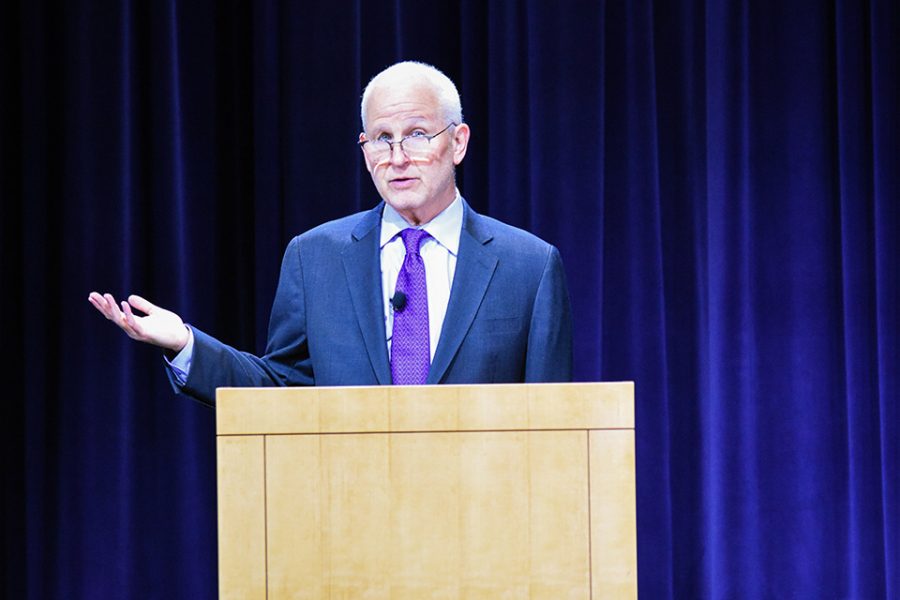Schapiro addresses student activism at ‘Conversations with the President’
Sophie Mann/Daily Senior Staffer
University President Morton Schapiro speaks at the second of two “Conversations with the President” on Tuesday. He said he respects students’ free speech and their use of peaceful protest.
April 27, 2016
University President Morton Schapiro discussed the state of student activism on campus Tuesday morning, saying the administration has tried to respect students’ free expression and crediting students for using peaceful forms of protest.
During the second of two “Conversations with the President,” the first of which was held on the Chicago campus last week, Schapiro and a panel of administrators addressed how the University can respond to student activist demonstrations while maintaining the integrity of University rules. Schapiro said he respects freedom of speech and stressed the importance of defending it.
“Uncomfortable learning is what we want students to engage in,” Schapiro said, “and sometimes we have uncomfortable learning, too.”
The event comes weeks after pro-divestment student activists demonstrated outside Schapiro’s Evanston home.
Vice President for Student Affairs Patricia Telles-Irvin said student activism reflects students’ passion for both the University and society. She said the administration has been clear in its efforts to both communicate and engage with students.
“We were handed 34 demands and there are some that are very legitimate and we want to make sure that we are addressing those issues,” Telles-Irvin said in reference to a list of demands reintroduced by students in January.
Roughly 200 students, faculty and staff filled the seats of the McCormick Foundation Center Forum and more than 400 viewers tuned in via live webcast for the event, sponsored by the Northwestern University Staff Advisory Council, the Faculty Senate and the Office of the President.
Schapiro also addressed the resignation of former ambassador to Afghanistan Karl Eikenberry from his appointment as executive director of The Buffett Institute for Global Studies. Schapiro said he and Provost Dan Linzer interviewed the finalists and picked the candidate they felt was the best.
“It was a very good search, contrary to what some people assert or allege,” Schapiro said. “I thought he had the potential to be a transformative leader for the Buffett Institute, and it’s with great regret that it didn’t work out.”
Schapiro was joined by Linzer, Executive Vice President Nim Chinniah, Telles-Irvin and Vice President and General Counsel Philip Harris to answer questions during the panel discussion.
During Schapiro’s address, he detailed the University’s achievements and challenges over the past year as well as its plans for the future. Schapiro highlighted the University’s desire to make itself more accessible for local, international and undocumented students. Through partnering with Evanston and Chicago, upgrading financial aid packages and rebranding, he said NU has taken an active approach to attracting top students.
“We’re supposed to serve the public good, and we are, but God knows I want as many of those brilliant young men and women to come to Northwestern,” Schapiro said. “We want the best students in this country, certainly in Evanston and Chicago, but more broadly throughout the country and the world.”
Staff Advisory Council chair Tracey Gibson-Jackson, assistant director for Student Organizations and Activities, said the panel addressed all of the community’s pre-submitted questions in addition to questions asked on the spot. This year marked the second year of the panel as part of the annual event, Gibson-Jackson said.
“It gives people a chance to hear about all the different initiatives that are happening around campus,” Gibson-Jackson told The Daily. “It’s nice that everybody is in the same place — it’s kind of like the University State of the Union. It’s a way to educate the Northwestern community on what’s happening.”
Email: [email protected]
Twitter: @kellipnguyen


